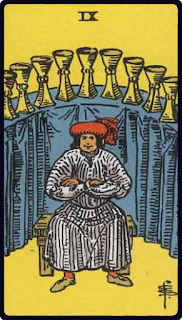
Representing anticipation; the 9 of Cups portends a period of calm once more with little or no movement. This period if it endures within a relationship could represent a life lived together, whilst without a relationship it can represent the anticipation of new opportunities to begin again, either with the same relationship or with another anew.
In the upright state the 9 of Cups represents a period without power or influence; this period will be marked by a relationship that you have devoted all that you can to ensure it succeeds with no action left but to bear witness and find out if it was enough.
In the inverted state the 9 of Cups represents dread, an expectation of negativity, perhaps the anticipation of the relationship coming to an end, or anxiety, or insecurity in the strength of the relationship leading to our anticipation of future conflict, i.e., the calm before the storm.
In the Rider-Waite deck the 9 of Cups is depicted by a man sitting alone upon a bench in anticipation with 9 golden cups in his wake representing the efforts and devotion he has bestowed. The emphasis here is placed on patience and quiet reflection with no other action available that would not in itself risk the relationship.
In self-refection the 9 of Cups serves as a prompt to consider what is within your grasp, what your next move might be and plan ahead for any opportunity that might present itself. This can be an opportunity to consider the future and what you want from the relationship. In romantic relationships this may be the question of marriage or having a family; in platonic relationships this may simply be a question of how close you want to be to someone.
Ask yourself “How close do I want to be?” and “Where is this going?” or “Is this enough?” - Where this specifically relates to your own emotions and feelings it can be a question of whether or not you feel like you have something to look forward to; ask yourself “What gives me hope?” reaching a point where you are content in the moment is an important achievement but your contentment like any emotion will lessen in intensity over time.
Human beings are naturally inclined to boredom when things become repetitive and predictable over time; this is caused by exhaustion of the Amygdala, a small almond sized structure in your temporal lobe which regulates emotion, it acts like a muscle being constantly worked. The Amygdala has the strongest response to novel experiences or variety, it becomes numb to repetition and when exhausted it causes a state of burnout. Emotions and feelings particularly those connected to relationships are not immune to this process.
Even when you find happiness the expectation of happy ever after can’t be realised; you need to make a conscious effort to sustain and maintain happiness over time.

No comments:
Post a Comment
All comments are moderated before they are published. If you want your comment to remain private please state that clearly.